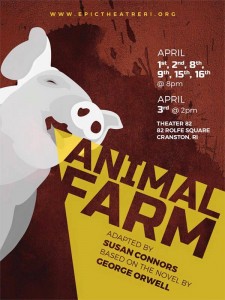 George Orwell was one of the most influential writers of the 20th Century and Animal Farm is his most widely read book, but that is because it is short rather than because it is good. Orwell was primarily an essayist: His journalism and non-fiction, although no longer commonly read, demonstrated remarkable prescience and ability. His one great work of fiction, Nineteen Eighty-Four, is vastly superior to his earlier Animal Farm in depth and sophistication.
George Orwell was one of the most influential writers of the 20th Century and Animal Farm is his most widely read book, but that is because it is short rather than because it is good. Orwell was primarily an essayist: His journalism and non-fiction, although no longer commonly read, demonstrated remarkable prescience and ability. His one great work of fiction, Nineteen Eighty-Four, is vastly superior to his earlier Animal Farm in depth and sophistication.
The problem with Animal Farm is that it is extremely simplistic, retelling the history of the Soviet Union from the Bolshevik revolution to the Great Patriotic War (World War II) by substituting pigs for historical individuals: “Old Major” (Frank O’Donnell) is Vladimir Lenin who enunciates founding principles and drops dead, “Napoleon” (Jason Quinn) is Joseph Stalin who takes over by increasingly brutal and oppressive methods, “Snowball” (Dan Fisher) is Leon Trotsky who is run off the land in fear of his life, and “Squealer” (Justin Paige) is Vyacheslav Molotov who spouts ridiculous propaganda explaining why oppression makes everyone happier and revises the historical record with outright lies. The horses are the Marxist classes: “Boxer” (Andrew Conley) is the proletariat, “Clover” (Vanessa Blanchette) is the intelligentsia, and “Mollie” (Lexie Lankiewicz) is the bourgeoisie. The goat “Muriel” (Lankiewicz) and the donkey “Benjamin” (Jack Albanese) are transparent proxies, respectively, for the press and for Orwell himself. The humans are referenced but not portrayed on stage: “Mr. Jones” who is Czar Nicholas II, “Mr. Frederick” who is Adolf Hitler, and “Mr. Pilkington” who is Winston Churchill. The allusions are not subtle.
Despite its shortcomings, Animal Farm has been repeatedly adapted into dramatic form, first as a radio play in 1947 shortly before Orwell’s death, then as an animated film in 1954 (secretly funded, bizarrely, by the American Central Intelligence Agency) modified to end more “happily,” and eventually as a live-action film in 1999 that tried to catch up the story through the collapse of the Soviet Union. The adaptation at Epic Theatre Company by Susan Connors uses almost entirely Orwell’s words from the novel except for some very brief framing material at the beginning. It sets the scene in a political telephone bank where the narrator (Ian Hudgins) finds a copy of the book, although the framing story is never referenced again. This is problematic because, no matter how well performed, the effect is pretty much having an abridged version of the novel read aloud to the audience.
That said, it is very well acted. Quinn as “Napoleon” is a large and imposing person who dominates with stage presence, exactly the antithesis of the real Joseph Stalin who was only about 5’5” – to which Orwell’s choice of “Napoleon” for the character was very likely a mocking reference, especially taking into account that the notoriously short Emperor of France was actually an inch taller. Fisher as “Snowball” realizes the doomed earnestness of his role. Paige as “Squealer” smugly oozes obsequiousness so effectively as to inspire a desire to strangle him. Although having few lines, Conley as “Boxer” and Albanese as “Benjamin” capture their characters perfectly. Big Nazo collaborates on a brief but memorable appearance that is far more than a mere cameo.
Director Kevin Broccoli writes in his notes, “When we started working on the play, it seemed to only slightly mirror what was going on in the political world. As we approach opening night, it’s starting to feel more like a docudrama.” It’s difficult to tell how seriously he intends that claim, as the main flaw of Animal Farm is that it does not concern universal political principles in the way that Nineteen Eighty-Four does, but is instead grounded in a scenario of particular people and events: Donald Trump, no matter how much his persona uncannily echoes Benito Mussolini, is far from Joseph Stalin; Hillary Clinton, no matter how much she twists facts, rewrites history, and negotiates pacts with totalitarian egomaniacs, is far from Vyacheslav Molotov; and Bernie Sanders, no matter how much he tilts at windmills, is far from Leon Trotsky.
Epic makes the most of the weak source material for an entertaining hour or so, and the story will be easy to follow regardless of whether you have read the book – or, having been forced to read it in high school, have now forgotten it.
Animal Farm, directed by Kevin Broccoli, by Epic Theatre, at Theatre 82, 82 Rolfe Sq., Cranston. Handicap accessible. Fri (4/15), Sat (4/16) 8pm. One act, 1h5m. Free to high school students. Web site: epictheatreri.org/ Tickets: rtists-exchange.org/epictheatrecompany.html